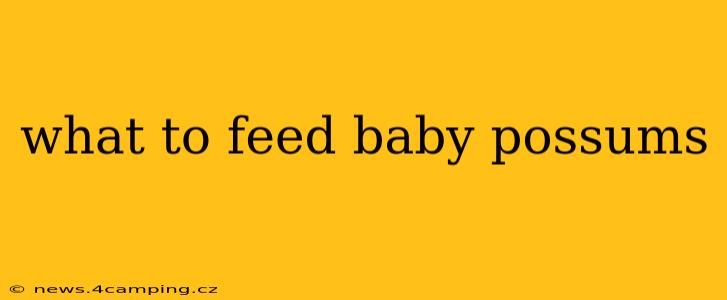Finding a baby possum can be alarming, but it's crucial to understand that these tiny marsupials require specialized care. Improper feeding can be detrimental to their health and survival. This guide will provide you with essential information on what to feed baby possums, addressing common concerns and misconceptions. Remember: Your first step should always be to contact a licensed wildlife rehabilitator. They are best equipped to handle and care for orphaned or injured possums. This information is for educational purposes only and should not be considered a replacement for professional wildlife rehabilitation.
What NOT to Feed Baby Possums
Before discussing appropriate foods, let's clarify what should never be given to baby possums:
- Cow's milk: Cow's milk is too rich and can cause severe digestive problems, leading to diarrhea and death. Possums lack the enzymes to properly digest it.
- Dog or cat food: These foods are unsuitable nutritionally for possums. They lack the necessary nutrients and often contain ingredients that are toxic to them.
- Bread, sweets, or human food: These offer little to no nutritional value and can disrupt their delicate digestive system.
- Raw meat: This carries a high risk of bacterial contamination.
What to Feed Baby Possums: Formula and Supplemental Foods
Wildlife rehabilitators typically use commercially available formulas specifically designed for orphaned marsupials. These formulas are carefully balanced to meet the nutritional needs of possums. However, if you find yourself in an emergency situation before contacting a professional, here's some information:
Emergency Feeding (Contact a Rehabilitator Immediately):
If immediate professional care isn't available, a temporary solution might involve a diluted formula such as KMR (Kitten Milk Replacer). Crucially, dilute it significantly, using significantly more water than recommended for kittens. Even this diluted formula should only be considered a temporary measure.
Foods Suitable Under Professional Guidance:
Rehabilitators often incorporate supplementary foods into a possum's diet as they mature. These may include:
- Insects: Mealworms, crickets, and other small insects are important sources of protein. These should be appropriately sized for the possum's age and always gut-loaded (fed nutritious food before being given to the possum).
- Puréed fruits and vegetables: Small amounts of finely puréed fruits (like bananas or berries) and vegetables (like sweet potato or squash) can provide additional nutrients under the guidance of a wildlife professional.
How Often Should I Feed a Baby Possum?
The feeding frequency depends on the possum's age and size. Very young possums will need to be fed frequently, possibly every 2-3 hours, while older joeys may only require feeding several times a day. A wildlife rehabilitator will provide specific instructions based on the individual possum's needs.
What if the Baby Possum is Found with its Mother?
If the baby possum is found with its mother, do not intervene. The mother is likely caring for it, and human interaction can disrupt their bond and potentially stress the mother, leading to her abandoning the baby. Observe from a distance. If the mother seems unresponsive or if you have safety concerns, contact wildlife professionals.
How Can I Find a Wildlife Rehabilitator?
Finding a licensed wildlife rehabilitator is essential. You can search online for "[your state/region] wildlife rehabilitator" or contact your local animal control or veterinary office for referrals. They will provide appropriate care and guidance to ensure the possum's survival.
This guide provides essential information on what to feed baby possums. However, it's vital to remember that these animals require specialized care best provided by trained professionals. Always contact a licensed wildlife rehabilitator as soon as possible. They are the only ones qualified to provide proper nutrition, care, and eventual release back into the wild.
